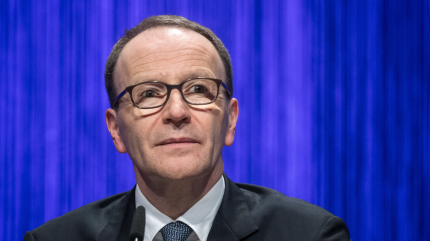
Mark Schneider, chief executive of Swiss giant Nestlé, is set to depart the company after eight years at the world’s biggest food company.
The KitKat and Maggi brands owner revealed today (22 August) it had appointed Laurent Freixe, current executive vice president and CEO of Nestlé’s Latin America business, as Schneider’s successor from 1 September.

Discover B2B Marketing That Performs
Combine business intelligence and editorial excellence to reach engaged professionals across 36 leading media platforms.
Nestlé did not disclose the reasons behind Schneider’s departure, but said he “decided to relinquish his roles as CEO and member of the board of directors”.
Schneider joined Nestlé from Germany-based healthcare company Fresenius at the start of 2017, taking the reins from Paul Bulcke, who is now chairman of the Nestlé board of directors.
Freixe joined Nestlé in France in 1986. His career at the company included managing its Zone Europe during the financial and economic crisis, from 2008 until 2014. He then took over as CEO of Zone Americas and, following changes to Nestlé’s new Zone structure in 2022, Freixe was named CEO of Zone Latin America.
Bulcke described Freixe as the “perfect fit for Nestlé at this time” and expressed his “gratitude to Mark for his significant contributions to Nestlé and for his outstanding, steady leadership in turbulent times”.

US Tariffs are shifting - will you react or anticipate?
Don’t let policy changes catch you off guard. Stay proactive with real-time data and expert analysis.
By GlobalDataFreixe said: “I am privileged to have been given the opportunity to continue building and strengthening Nestlé, and I am excited to take on this responsibility.
“There will always be challenges, but we have unparalleled strengths, such as iconic brands and products, an unmatched global presence, leading innovation and execution capabilities, and above all, exceptional people and teams. We can strategically position Nestlé to lead and win everywhere we operate.”
The company also recently announced another C-suite change, naming London Stock Exchange Group finance chief Anna Manz as CFO last year.
Schneider added: “Leading Nestlé for the past eight years has been an honour for me. I am grateful for what we have achieved, having transformed Nestlé into a future-proofed, innovative and sustainable business.
“I would like to thank the entire Nestlé community for what we have accomplished together and wish Laurent all the best in his new role.”
Schneider’s tenure was marked by moves to reshape Nestlé’s portfolio through asset disposals. These included the first major disposal of its US confectionery business, including brands such as Butterfinger and Raisinets, to the privately-owned Ferrero for a deal worth Sfr2.8bn (then $2.91bn) in 2018.
Following that sale, Daniel Loeb, the activist investor who was pushing for change at Nestlé, said he expected the “decisive disposal of other ill-fitting businesses”.
The Swiss company struck a deal one year later to sell its ice-cream business in the US to Froneri, the global ice-cream supplier which the world’s largest food maker co-owns with private-equity firm PAI Partners.
Froneri agreed to pay $4bn for the business that included brands like Drumstick, as well as the local licence to Häagen-Dazs.
Schneider narrowed the company’s focus on fewer categories, including pet food, coffee and infant nutrition, which have been central to the business’ recent sales growth.
Last month, Nestlé trimmed its forecast for organic growth in 2024 from “around” 4% to “at least” 3%. It also cut its EPS guidance from 6-10% to a mid-single-digit range.
Nestlé’s share price stood at Sfr73.10 (then $71.20) on 23 December 2016 shortly before Schneider took the wheel. Today, at the close of market trading, Nestlé’s share price reached Sfr89.44 ($104.92).





